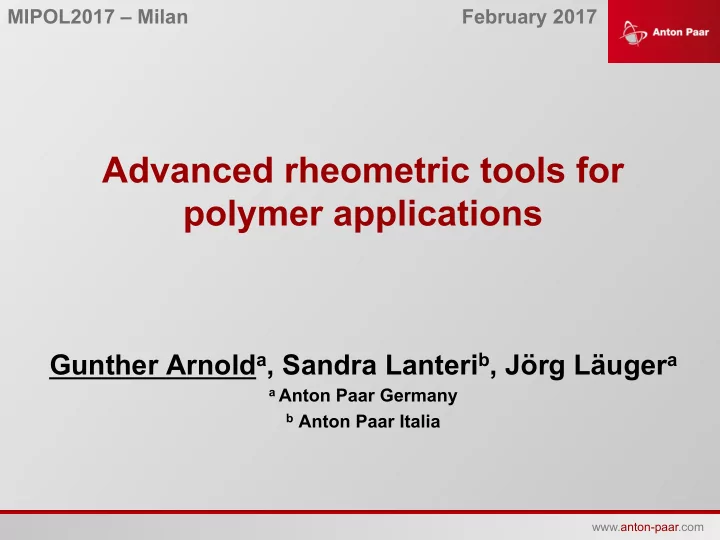

MIPOL2017 – Milan February 2017 Advanced rheometric tools for polymer applications Gunther Arnold a , Sandra Lanteri b , Jörg Läuger a a Anton Paar Germany b Anton Paar Italia www.anton-paar.com
Cone Partitioned Plate Edge fracture Ø Deformation of the sample surface Ø Propagates radially Function of time Function of deformation Ø Limits accuracy of Start up shear measurements Flow curves LAOS measurements Mattes, K.M., Vogt, R., Friedrich, C.(2008) Analysis of the edge fracture process in oscillation for polystyrene melts. Rheo Acta 47 929-942 www.anton-paar.com
Cone Partitioned Plate Edge fracture Ø Deformation of the sample surface Ø Propagates radially Function of time Function of deformation Ø Limits accuracy of Start up shear measurements Flow curves LAOS measurements Mattes, K.M., Vogt, R., Friedrich, C.(2008) Analysis of the edge fracture process in oscillation for polystyrene melts. Rheo Acta 47 929-942 Edge fracture effects in PDMS as a function of the set deformation www.anton-paar.com
Cone Partitioned Plate Limiting the effects from edge fracture and fracture propagation Cone Partitioned Plate Ø larger strain rates in rotational testing Ø larger amplitudes in oscillatory testing Schweizer, T. (2003) Comparing cone partitioned plate and cone standard plate shear rheometry of a polystyrene melt. J Rheo 47, 1071-1085 www.anton-paar.com
Cone Partitioned Plate Limiting the effects from edge fracture and fracture propagation Example: Amplitude Sweep Sample: PDMS Frequency: 1 rad/s Strain: 1 % - 1000 % Temperature: 25 °C www.anton-paar.com
Cone Partitioned Plate Limiting the effects from edge fracture and fracture propagation Example: Start up shear measurement Sample: PDMS Shear rate: 0.1/1/5/10/30 1/s Temperature: 25 °C www.anton-paar.com
Cone Partitioned Plate • Determination of material constants of the Wagner damping function • Prediction of extrudate swell as influenced by the aspect ratio of capillary dies Stress growth after step shear rate Simulated vs. experimental swell profiles HDPE at 200 ° C www.anton-paar.com
Rheology and combined Techniques Additional information on the micro-structure Example: Rheo-Microscopy: simultaneous to rheology Macroscopic Microscopic material functions structure parameters § Optical techniques: • SALS (Small Angle Light Scattering) • Microscopy • Polarized Light Imaging Rheometry Microscopy • Particle Image Velocimetry § SAXS § SANS § Dielectric spectroscopy Rheo-Microscopy www.anton-paar.com
Rheo - Microscopy Droplet size and shape is related to the shear rate and shear history Advantage: Interrelation between macroscopical behavior (rheology) and microstructural origin W/O Emulsion Drawback: Structure of interest moves out of the microscopic view to fast. www.anton-paar.com
Rheo - Microscopy: Counter Rotation Counter rotation produces a stagnation plane • Structures are stretched and rotated but not moving • Same structures can be followed www.anton-paar.com
Rheo - Microscopy: Counter Rotation Counter rotation produces a stagnation plane • Structures are stretched and rotated but not moving • Same structures can be followed Side View Bottom View Shear gradient Neutral direction or Vorticity direction PIB in PDMS Shear flow direction Shear flow direction www.anton-paar.com
Rheo - Microscopy: Counter Rotation Counter rotation produces a stagnation plane • Structures are stretched and rotated but not moving • Same structures can be followed Side View Bottom View Shear gradient Neutral direction or Vorticity direction PDMS in PIB Shear flow direction Shear flow direction www.anton-paar.com
Humidity or Moisture Content - Background Humidity control in mechanical testing: § Some DMTA Instruments offer Humidity Option § limitations with respect to geometries, samples and measuring ranges § Customized solutions § Modified commercial oven § Measurements in extension on PE-films and membranes for fuel cells with a tool for extensional rheometry (SER) § Monitoring the impact of water as plasticizer www.anton-paar.com
Humidity - Impact in Polyamide Example Polyamide 6.6 at 50 °C Stepwise humidity change Sample pretreatment • stored at ambient conditions Below 20% relative humidity • water desorption Above 20% relative humidity • water absorption Water behaves like a plasticizer Settings Frequency: 1 Hz / Strain: 0.01% Relative Humidity: 5/10/20/30/40/50% www.anton-paar.com
Humidity - Impact in Polyamide Example Polyamide 6.6 Temperature ramp at various but constant relative humidity • Maximum in G‘‘ shifted to lower temperatures for increasing RH • Reduction of T g due to increase of RH Settings Sample predried (12 h; 50 °C ; 5% RH) Frequency: 1 Hz / Strain: 0.01% Heating rate: 1K/min www.anton-paar.com
Humidity – Impact on Curing Reactions Example Polyurethane 2 Interval stepwise humidity change Interval I: RH = 5% • Dominant viscous properties Interval II: RH = 20/40/60% • Increase of G ′ and G ″ • Cross-over • Approach to plateau values Decreasing relative humidity: • Slower curing reaction RH is one key parameter for an optimum curing process Settings Frequency: 10 rad/s Strain: 20% Temperature: 60 °C www.anton-paar.com
Conclusions Limiting the effect of edge fracture § Cone Partitioned Plate geometry and Separate Motor Transducer Mode reduce measuring errors at large deformations § Extended deformation range for LAOS and Start up shear measurements Rheology and Microstructural Analysis § Interrelation between macroscopical behavior and its microstructural origin Impact of ambient conditions § Characterizing mechanical parameters as function of Relative Humidity § Humidity Option enables to simulate processing/storage conditions www.anton-paar.com
Thank you for your attention www.anton-paar.com
Recommend
More recommend